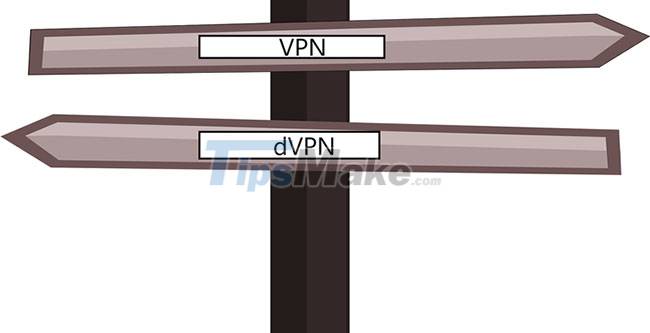Is a decentralized VPN more secure than a regular VPN?
These nodes receive money for maintaining services and providing a more secure network. But does a dVPN secure connections more effectively than a regular VPN? Join TipsMake.com to find the answer through the following article!
Is dVPN more secure than a regular VPN?
A typical VPN has a central provider that manages the re-routing of Internet traffic. While most VPN providers claim to not log data, there's no way to be sure they don't sell your information to third parties.
Standard VPNs are also closed source, so there's no way to be sure the VPN actually encrypts the traffic or whether the provider has a backdoor that could expose the traffic. For this reason, regular VPNs are more vulnerable to attacks and their logs can be tracked.
Meanwhile, dVPN runs on a system where you allocate part of your bandwidth to other users on the network and get back available IP addresses for use.
You may even be compensated in some form of cryptocurrency for allowing others to use your resources. You can get Ethereum and BAT (Basic Attention Token, a kind of Ethereum token) for your contribution.

The most secure aspect of dVPN is its centralized nature that prevents any form of logging, as all data is distributed between different nodes. Since there is no single node responsible for handling all of your requests, it is impossible to discover what you browse or who you are.
Also, dVPN is open source, which means anyone can open the source code and explore it. With a little technical savvy, anyone can check for suspicious elements and log reports to the developer if they find bugs.
Conclusion: Can you trust dVPNs?

The main job of a VPN is to hide IP addresses, help users bypass Internet censorship, encrypt and route data, and prevent data breaches. Obviously, a VPN is an essential tool for Internet privacy, but since not all privacy tools are created equal, it's important to understand the differences between them in order to make a decision. Clever decision.
A decentralized blockchain-based VPN that does not rely on a central point of control. Without a single authority, the system is naturally fairer and more secure.
So, if you are still apprehensive about using dVPN, just know that, to ensure anonymity and privacy on the web, a decentralized VPN is the better choice.
In summary, if you compare the security aspects of both VPNs, dVPN is clearly the winning option as it offers better connection security, privacy, and anonymity.